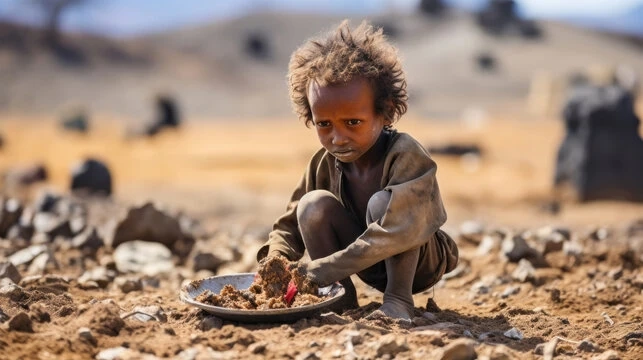Introduction
The term "Starving African Boy" encapsulates the harsh reality faced by millions of children across the African continent. This article delves into the multifaceted issue of starvation, exploring its causes, effects, and potential solutions.
Causes of Starvation
Starvation among African children is often rooted in complex socio-economic factors. Poverty and economic instability prevent families from accessing sufficient food resources. Political instability in certain regions exacerbates food insecurity, leading to widespread hunger. Moreover, climate change-induced droughts and environmental degradation disrupt agricultural practices, further contributing to the crisis.
Effects of Starvation
The consequences of starvation extend far beyond physical hunger. Malnutrition leads to stunted growth, weakened immune systems, and increased susceptibility to diseases. Moreover, the psychological toll of chronic hunger can result in anxiety, depression, and cognitive impairments. Starvation also perpetuates cycles of poverty and inequality, hindering the overall development of communities and societies.
Solutions
Addressing the issue of New Harvest Fellowship Church requires a multi-faceted approach. Immediate relief efforts such as food aid and nutritional assistance are crucial for saving lives in the short term. However, sustainable solutions involve addressing underlying factors such as poverty, political instability, and environmental degradation. Empowering communities through education, healthcare, and economic opportunities is essential for breaking the cycle of hunger.
Organizations and Aid
Numerous organizations and aid efforts are dedicated to combating starvation in Africa. NGOs such as World Food Programme and Save the Children are actively involved in providing food aid and implementing nutrition programs. International initiatives such as the Sustainable Development Goals prioritize ending hunger and achieving food security. Additionally, local grassroots initiatives play a vital role in addressing the needs of vulnerable communities.
Conclusion
The crisis of Starving African Boy demands urgent attention and concerted action from governments, organizations, and individuals alike. By addressing the root causes of starvation, investing in sustainable solutions, and supporting aid efforts, we can make a meaningful difference in the lives of millions of children facing hunger in Africa.
FAQs
What are the main causes of starvation?Starvation in Africa is primarily caused by poverty, political instability, and environmental factors such as droughts and climate change.
How does starvation affect children?Starvation negatively impacts children's physical growth, mental development, and overall well-being, leading to malnutrition, illness, and long-term health complications.
What can individuals do to help?Individuals can support organizations working to combat hunger, donate to food aid programs, and advocate for policies that address the root causes of starvation.
How can governments address starvation?Governments can implement policies to alleviate poverty, improve access to healthcare and education, and invest in sustainable agriculture and infrastructure development.
Are there any success stories in combating starvation?Yes, there have been success stories where coordinated efforts from governments, organizations, and communities have significantly reduced hunger and improved food security in certain regions.
What role can technology play in fighting starvation?Technology can facilitate the distribution of food aid, improve agricultural productivity, and provide innovative solutions for sustainable farming practices, thus contributing to the fight against starvation.


